Text
Center for Native American Studies to lead community field trip to Sugar Bush
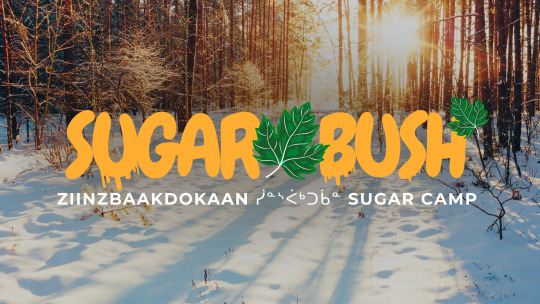
MARQUETTE, Mich. -- The Center for Native American Studies will be facilitating a visit to the Dynamite Hills Farm sugar bush (Jerry Jondreau and Katy Bressett's home) in L'Anse, Michigan on Friday March 20, 2020.
This marks the beginning of minokami (time of the good earth) for the Anishinaabek. Participants must bring food to share, a folding chair, a dish bag (bowl, utensils, and a water bottle), and snow shoes.
Limited transportation is available for the first 25 people to sign up by calling 906-227-1397, or dropping by the CNAS. The vans will be leaving NMU at 8am and returning at 9pm. Dress for the season!
Visit nmu.edu/cnas/upcoming-events for details on all upcoming events.
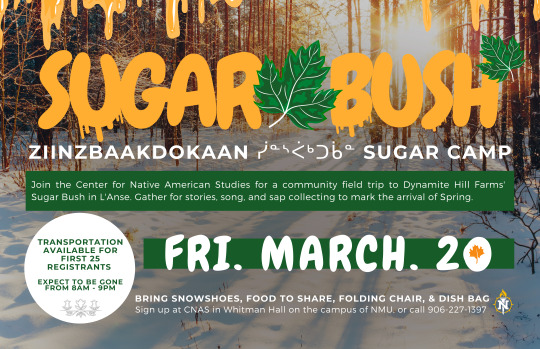
1 note
·
View note
Text
NMU students plan event to teach about traditional games
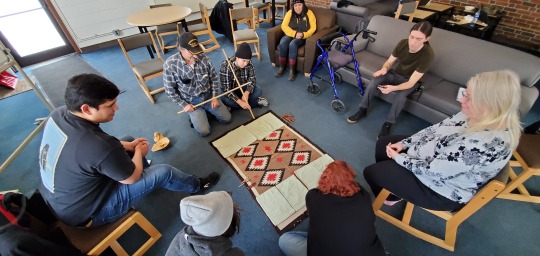
MARQUETTE, Mich. – Northern Michigan University students are hosting engagement initiatives and extending outreach to various Native American communities in the Upper Peninsula. Under the direction of Native American Studies (NAS) professor April Lindala, this capstone-level curriculum tasks NMU students to identify Native American community needs and implement engagement projects to revitalize aspects of culture.
The first of four outreach activities planned by students in the NAS-488 ‘Native American Community Engagement’ course is scheduled in cooperation with the Native American Student Association (NASA). The students will host the 2020 NMU Moccasin and Dish Games on Friday, March 13 from 3 to 7 p.m. ET in Whitman Hall Commons on the campus of NMU. In addition to invitations extended to the public, NAS-488 is welcoming Native high school students to participate in the event held in conjunction with NMU’s Wildcat Weekend.
“We are bringing this event to the community for community members, students, and faculty to come together in a common space and celebrate Anishinaabe people and their cultures,” said NMU student Bazile Panek. “Doing this as part of Wildcat Weekend gives Native high school students the chance to observe that Anishinaabe culture and people are thriving at Northern Michigan University within our academic programs and student organizations.” Four special guests -- David Sam, Mary Sam, Damon Panek and Sophia Panek -- will give instructions on both the Moccasin Games (traditionally played by males) and the Dish Game (traditional played by females) for everyone to learn.
Bazile Panek, a sophomore, is using nearly a decade of experience to train his classmates in Moccasin Games. The guest instructors, members of Panek’s family, are visiting from the Red Cliff Band of Lake Superior Chippewa Indians in Wisconsin. The Paneks have been educating others through cultural immersion and instruction for a number of years.
By identifying leaders—including elders—in the Native community and extending invitations, the NMU students are learning that direct outreach is important due to ongoing misunderstandings in relations with tribal nations. “We’re are learning how to engage with Native communities; what it takes to talk to elders and find out what these communities need,” said NMU student Gary Trombley.
“Through resurgence in the (Native) community, we’re trying to revitalize humanity,” said NMU student Beckey Hilliker. “We’re noticing a lack of it, and the purpose of our projects is to re-engage them in activities that emphasize land, language, culture and food.”
The group is planning three other projects including storytelling, a traditional art workshop, and an Ojibwe language workshop; these activities will be scheduled soon.
# # #
NAS488 Native American Community Engagement is a capstone course for the Native American Studies major. Students create logic models and engage with multiple local American Indian communities to implement assessed and needed projects for communities.
1 note
·
View note
Text
Center for Native American Studies Now Hiring
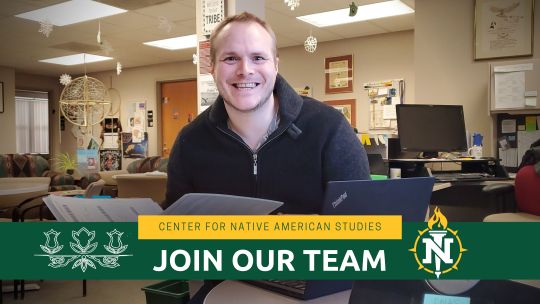
We are seeking a hardworking, reliable and trustworthy student to assist with the Center for Native American Studies with multiple office and programming needs. Student applicants should be available to work between 8 AM - 5PM Monday - Friday.
Duties and Responsibilities include:
• Student receptionist: answering phones and greeting visitors
• Assist staff with daily tasks and office needs
• Assist with promotions of CNAS activities, events, and programs (i.e. poster distribution, social media updating, website updates)
• Complete other duties or tasks as assigned
The ideal candidate should have proven demonstrated work experience in the following areas: can work independently, organizational skills, strong interpersonal and organizational communication skills, strong writing skills, knowledge of basic office procedures and protocol, comfortable with computers, and office machines (i.e. fax, copiers)
Application Requirements:
• NMU On-campus Employment Application tiny.cc/StudentApp
• Resume
• Cover letter explaining interest in the position
• Two references (Names & Telephone numbers)
Instructions for completing and uploading your application:
• Save the PDF document tiny.cc/StudentApp
• Type in the form, making sure to complete each field.
• Go to File, then Save As and save the completed application.
• Upload this file into the job posting on nmu.joinhandshake.com (along with any other required documents), or print out and drop off at CNAS.
1 note
·
View note
Text
Sault Tribe selected host site for environmental internship
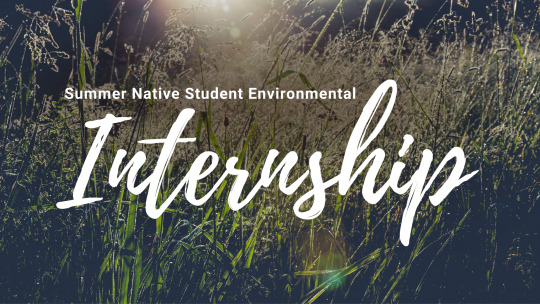
The Institute for Tribal Environmental Professionals (ITEP) has listed host sites for a paid 8-week summer internship. Students can spend your summer working with tribal organizations--one being Sault Tribe of Chippewa Indians-- to address tribal environmental issues. The internships have a technical, educational or policy focus. The ITEP is offering eight positions in air quality. The internship program provides each student intern with a $4,000 stipend, and limited housing and travel allowances. Host sites are selected from tribal environmental organizations, government offices, the US Environmental Protection Agency (USEPA) and others.
>> LEARN MORE >>
Eligible students must meet the following:
US Citizen
Identify as Native American/Alaska Native
Full-time undergraduate or graduate college student during Spring 2020 (12
hours undergrad, 9 hours grad) at any tribal college, college or university
Have at least a 2.5 cumulative GPA
Majoring in an environmental or related field like science, engineering,
planning, policy, law, management, political science, anthropology, or health
Interested in pursuing an environmental career after graduating
Proficient verbal and written communication skills
Strong interest in working with Native American tribes or topics
Please register at nau.edu/itepinterns for more information.
The deadline for applications is Feb. 28, 2020 and questions can be directed to Robin Bouschor, Sault Tribe Environmental Department - Environmental Specialist at (906) 632-5575.
The Sault Ste. Marie Tribe of Chippewa Indians (Sault Tribe) is a federally recognized Indian Tribe of over 44,000 members, located in the eastern Upper Peninsula of Michigan. The Tribe are Anishinaabeg (which can mean 'Original People' or 'Spontaneous Beings') and have lived in the Great Lakes area for millenia. Some of the oldest legends recall the ice packs breaking on Lake Nipissing and archeologists have found Anishinaabeg sites from 3000 B.C. Sault Tribe's ancestors were Anishinaabeg fishing tribes whose settlements dotted the upper Great Lakes around Lake Superior, Lake Michigan and Lake Huron, throughout the St. Marys River system and the Straits of Mackinac. Anishinaabeg gathered for the summers in places like Bahweting (Sault Ste. Marie) and broke up into family units for the winter.The Tribe's Environment Program's mission statement is 'To protect the health and wellbeing of present and future members of the Sault Ste. Marie Tribe of Chippewa Indians, by protecting the environment on which they depend.' We hope doing this study/assessment will help us with our mission.
About the Internship
The purpose of the project is to improve air quality in a tribal community in Michigan. The project involves doing an assessment of PM 2.5 exposure at three tribal casinos located in Sault Ste. Marie, MI, Hessel, MI and Christmas, MI. This will include the health aspect of PM 2.5 pollution, sampling methodologies, protocols, assessment design, data analysis and research into the effects of other casinos or other establishments that went smoke free. The research will contain not only human health effects but also economic effects when available. The information that is obtained will be presented to internal Tribal agencies through a PowerPoint presentation and a report will be written of findings. The intern will also assist Tribal staff at an outreach event at a Tribal Pow Wow, and assist in creating a hands on activity that is air quality related for the outreach booth.
The main goals are to learn about PM 2.5 indoor air pollution, and this will include the health issues associated with PM 2.5, sampling methodologies and protocols, data analysis and research the effects of other casinos/establishments that went smoke free.
Specific Tasks
Learn about PM 2.5 health issues
Obtain training from staff on operating a PM 2.5 sampler
Develop a document to record data accurately
With help from Environmental Staff develop appropriate sampling methodologies/design for this project
Travel with Environmental Staff to Casinos to conduct PM 2.5 sampling
Research of other establishments that went smoke free
Analyze data/research and write a report
Combine report information into an easy to follow PowerPoint presentation
Present report in PowerPoint format to internal Tribal agencies
Assist in creating an air quality related activity for an outreach event
Desired Skills
Intern will need to feel comfortable in operating a particle counter (no experience necessary, will be trained), strong research skills required, needs experience in word, excel, and PowerPoint, strong science background preferred.
About the Location
Harwoods Student Apartments (https://harwoodproperties.net/hillside-student.html) rentals offers student rentals at $700 a month, with the possibility of it being cheaper if roomed with other students, it can be as cheap as $175. There is no guarantee other students (From Lake Superior State University will be staying for the summer and renting), more will be known after mid May when LSSU term ends. Another option is renting from the Environmental Manager rental house on Eureka Street in Sault Ste. Marie, Michigan. This will be estimated to be $450 a month, and it comes furnished. In the area there are also hotels that will rent a room for the month. These typically cost $550-$650.
Public transportation is limited in our area, we have a cab company, Lyft/Uber. However, given the short distance from the potential housing sites the intern can use our departments bicycle during the course of the internship. It would be about a 5-10 minute bike ride, or 15-20 minute walk.
In the summer months there are a plethora of activities for all types' interests. We have ice skating at our local Tribal recreation facility, swimming at the LSSU pool, outdoor beaches such as Sherman Park Recreational area, fudgy lane, where you can get fudge an ice cream cone and watch as ship enter and leave the world famous Soo Locks, disc golf at Minneapolis Recreational Woods or at LSSU campus. We are also uniquely situated as a border city to Sault Ste. Marie, Ontario and they have a movie theaters, a mall and wonderful hiking trails. Last but not least experience a real drive in burger joint located near the Environmental Department that not only offered some of the best burgers around but also spectacular view of the St Mary's river and Canada.
0 notes
Link
Co-produced weekly with Public Radio 90, Anishinaabe Radio News is designed to share aspects of the discipline of Native American Studies as well as news from Indian Country. The focus of this week's episode with Professor April Lindala is Hawaiian scholar Haunani-Kay Trask.
0 notes
Text
Upcoming opportunities for NA students interested in Law School
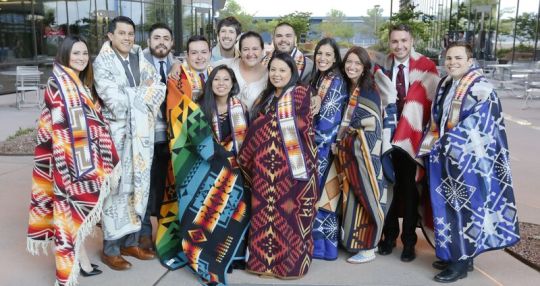
The faculty and staff of the Indian Legal Program (ILP) at the Sandra Day O’Connor College of Law at Arizona State University have great pride in the excellence of their program as a whole and the excellence students bring to the law school community.
The ILP is the biggest Native American law-focused program in the country that has welcomed citizens from 115 Tribes nationwide. There are 41 students currently enrolled, and 359 alumni work in a variety of fields all across the country. The program is continuing to expand its reach in Indian country and the legal profession.

In 2019, ILP announced the launch of the Indian Gaming and Tribal Self-Governance Programs, the first of its kind in the country, with its newest faculty members, Ann Marie Bledsoe Downes and Lawrence S. Roberts. With these two additions, ASU Law has six full-time Native Professors and three full-time Native staff members dedicated to the program in order to create an environment that better reflects the community it serves. Along with Bledsoe Downes and Roberts, Indian law experts include Patty Ferguson-Bohnee, Robert J. Miller, Trevor Reed and Erik Luna.
“The Indian Legal Clinic [ILC] is a huge part of our program,” said ILP staff, Ah'sha Notah in an e-mail. “Through the ILC, law students have the opportunity to work on real cases with actual clients in Indian Country to practice what they’ve learned in class with the guidance of our faculty. Serving clients while learning the law has a big impact on our surrounding community.”
The ILP’s Washington, D.C., Experience program gives students the opportunity to explore legal studies and practice in a totally new environment for a semester or a year in the U.S. capital. Students can take classes and extern for organizations in a variety of different areas.
“Thanks to some amazing partnerships with other universities, the ILP helps run the largest Native American pre-law program in the U.S., Pipeline to Law,” said Notah. “This initiative encourages young students to pursue higher education through law school by providing them with resources to succeed.”
The registration for the 2020 initiative is now open, which you can read more about here.
Through the ILP, students can earn juris doctorate and Master of Legal Studies degrees in Indian Law. Not only will these degrees help develop a legal career, but they also provide opportunities in a vast range of professions, according to our alumni’s experiences.
To keep up with ASU students, alumni, faculty, events and projects, find them on Facebook, Twitter, Instagram and LinkedIn for events, updates and information.
For any questions or comments, please feel free to reach out to see what resources ILP can provide. Staff says they are more than happy to talk with students, give tours and answer any questions about the program or law school in general.
To inquire about ILP, contact Kate Rosier, ILP Executive Director, at [email protected] or 480-965-6204.
0 notes
Link
0 notes
Text
Over 300 NMU scholarships offered, applications opening January
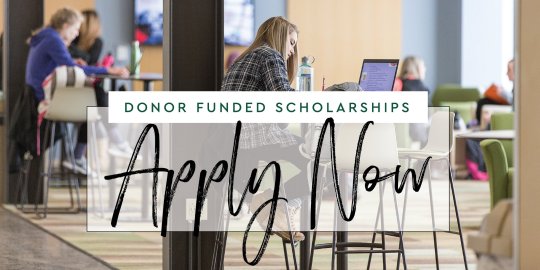
The NMU Donor-funded Scholarships application system for the 2020-2021 academic year will be open Monday, January 27, 2020 through Monday, February 17, 2020. During this time, students can submit an application through the online system by logging in through MyNMU and clicking on Financial Aid – Donor-funded Scholarships. Newly admitted students can click NMU Foundation Donor-funded Scholarships on the Admitted to NMU tab in MyNMU.
Over 300 scholarships are available. Criteria and award amounts vary from scholarship to scholarship and students can learn more at
www.nmu.edu/financialaid/node/82
Generous alumni, faculty, staff and other friends of the university are providing critical financial support to our students through hundreds of scholarship opportunities.
If you have questions regarding the scholarships or the application process, please contact Lara Clifton-Rice at Ext. 2325 or email [email protected].
0 notes
Text
American Philosophical Society looking to hire Native American scholars in training
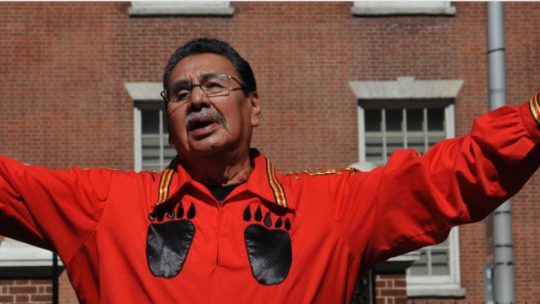
The American Philosophical Society in Philadelphia invites applications for summer undergraduate internships and predoctoral, postdoctoral, and short-term research fellowships from scholars at all stages of their careers, especially Native American scholars in training, tribal college and university faculty members, and other scholars working closely with Native communities on projects in Native American and Indigenous Studies and related fields and disciplines. These funding opportunities are supported by The Andrew W. Mellon Foundation Native American Scholars Initiative (NASI). Fellows will be associated with the APS’s Center for Native American and Indigenous Research (CNAIR), which promotes greater collaboration among scholars, archives, and Indigenous communities.
Undergraduate Summer Internship (deadline February 14, 2020)
These paid 8-week internships provide three talented undergraduates with the opportunity to conduct research, to explore career possibilities in archives and special collections, and to learn about advanced training in Native American and Indigenous Studies and related fields. The internship will take place from mid-June to mid-August 2019. During this time students will work at the APS Library & Museum and will also have the opportunity to travel to Native communities to share their work. The stipend is between $3000 and $3500 (depending on housing costs), plus a travel allowance. Further information about the internship and application process can be found at https://apply.interfolio.com/69444.
About the Center for Native American and Indigenous Research (CNAIR)
CNAIR focuses on helping Indigenous communities and scholars to discover and utilize the APS collection in innovative ways. The Collections comprise a vast archive of documentary sources (including manuscript materials, audio recordings, and images) related to over 650 indigenous cultures, predominantly from the United States, Canada, and Mexico. The Indigenous Subject Guide may be accessed through the CNAIR webpage: http://www.amphilsoc.org/CNAIR
--
0 notes
Text
Udall Foundation offers NA internship in D.C.
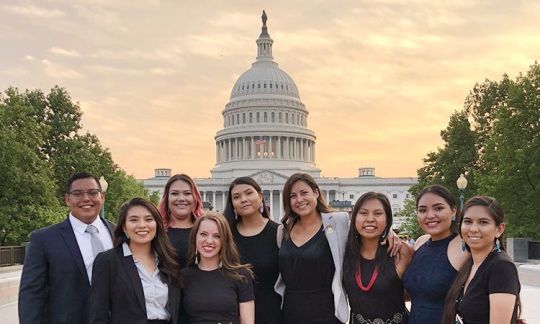
Photo credits: UF Congressional Interns 2018
With the new year comes new opportunities including the Udall Foundation’s Native American Congressional Internship.
This program for Native American and Alaska Native undergraduate (juniors/seniors), graduate, and law students offers a unique opportunity to gain professional leadership experience in Washington, D.C. Udall’s fully-funded, ten-week summer internship in Washington, D.C., offers distinctive opportunities for Native American and Alaska Native students who are interested in learning more about the Federal legislative process while gaining an insider’s view of the government’s unique trust relationship with Tribes.
Interns work in congressional and agency offices where they have opportunities to research legislative issues important to Tribal communities, hone their legal research and writing skills, and network with public and Tribal officials and Tribal advocacy groups.
The Foundation seeks candidates who demonstrate academic excellence, leadership qualities, and an interest in working with Native American issues and policy. Interns are provided round-trip airfare, lodging, per diem, and an educational stipend. Download the application from Udall Foundation’s website and submit it by the January 31st deadline (postmark or email).
Follow Morris K. Udall and Stewart L. Udall Foundation on Facebook, Instagram, and Twitter to get updates on this program. They are also conducting Facebook Live broadcasts to discuss the internship program and provide helpful information and application tips—check out our hashtag, #UdallInternship2020! Feel free to follow up with additional questions or concerns.
youtube
0 notes
Text
NAS Course Offerings Winter 2020
MARQUETTE, Mich. -- NMU’s Center for Native American Studies will be registering students for class soon. The following are our course offerings.
Step 1: Login to mynmu.nmu.edu
Step 2: Use the CRN to register

NAS 101 – Anishinaabe Language Culture & Community
tiny.cc/NAS101
MTWR Web 1P – 2:40P Lancaster CRN: 10439
Applies toward the human expression (hume) general education requirement.
4 cr.
An introduction to Anishinaabemowin language including grammar, vocabulary, idioms and syllabics. Students will learn to read, write and speak basic Anishinaabemowin. This course also promotes the preservation of Anishinaabe culture by examining various facets of Anishinaabe everyday life and contemporary issues.

NAS 102 – Anishinaabe Language Culture & Community
tiny.cc/NAS102
MTWR Web 1P – 2:40P Sojourn CRN: 11245
Applies toward the human expression (hume) general education requirement.
Prerequisite: NAS 101 or equivalent.
4 cr.
An in-depth study of Anishinaabemowin language. This course is a continuation of materials introduced in NAS 101. Students will focus on higher-level use of the language and will apply it in situations related to contemporary Anishinaabe cultural issues and community structures.

NAS 204 – The Native American Experience
tiny.cc/NAS204
T 6P – 9:20P Brozzo CRN: 10267
TR 2P – 3:40P Chailier CRN: 10268
Second Half Semester Web Kuehnl CRN: 12300
Applies toward the social responsibility in a diverse world (socr) general education requirement.
Applies toward the world cultures university requirement (wc).
4 cr.
A study of the development of Native American history, culture, attitudes and issues from the prehistoric era to the contemporary scene, focusing on native culture in the Great Lakes region. Shared native world view, contact experience and native peoples’ contributions to world culture are an important part of the course.

NAS 224 – Native American Beadwork Styles
tiny.cc/NAS224
F 9A – 12:20P Lancaster CRN: 12299
4 cr.
An introduction to Native American beadwork styles from various regions and time periods. The course blends reading and lecture with practical application of Native American beadwork. Content includes American Indian arts and crafts law.

NAS 280 – Storytelling by Native American Women
tiny.cc/NAS280
M 6P - 9:20P Brozzo CRN: 10454
Applies toward the perspectives on society (pers) general education requirement.
Applies toward the world cultures university requirement (wc).
4 cr.
This course examines a myriad of historic and contemporary aspects of native life through the eyes and stories of Native American women. Subjects include customs, culture, family, generations, mothers, daughters, grandmothers, art, education, fiction, poetry, political activism and spirituality.

NAS301 – Anishinaabemowin & Cultural Expression
tiny.cc/NAS301
MW 9A – 10:40A Sojourn CRN 12234
Prerequisite: NAS 101
4 cr.
This course builds on the grammar, linguistic mechanics, vocabulary and cultural knowledge introduced in NAS 101 Anishinaabe Language, Culture and Community I. Where possible, the course will use Anishinaabemowin replacement terminology for linguistic concepts. This course will look at more advanced concepts of culture such as ancestral governance, narrative, health systems, decolonization and renewal of ancestral culture in contemporary contexts.

NAS310 – Tribal Law And Government
tiny.cc/NAS310
W 6P – 9:20P Friisvall Ayres CRN 10455
Prerequisite: EN 211 with a grade of "C" or better or HON 101 and HON 111 and sophomore standing.
4 cr.
A focus on the relationship between American Indian tribes, the federal government and states. Emphasis is placed on examining the current state of tribal governments and tribal citizens within the State of Michigan. Students will examine the U.S. Constitution, treaties and tribals [tribes], federal and state laws and court cases.

NAS315 – History of Boarding School Education
tiny.cc/NAS315
Web Chaillier CRN 10864
Applies toward the integrative thinking (intt) general education requirement.
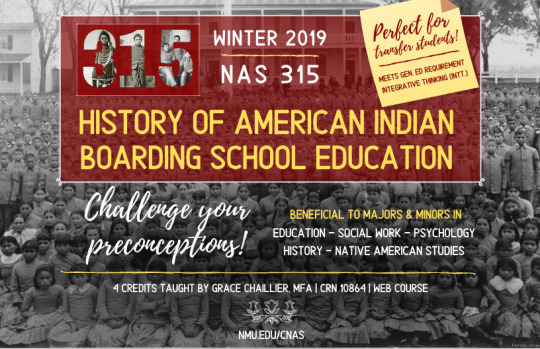
4 cr.
The history of the initiation, development, alteration and demise of the federally mandated Indian boarding school education experience in the U.S. and Canada. Intergenerational and contemporary repercussions, both positive and negative, within indigenous societies are considered.

NAS330 – NA Culture, Dynamics & Religious Expression
tiny.cc/NAS330
First Half Semester Web Kuehnl CRN 11036
Applies toward the perspectives on society (pers) general education requirement.
Applies toward the world cultures university requirement (wc).
4 cr.
An examination of the traditional philosophies of the native peoples in the Great Lakes region as well as an exploration of how Christianity has influenced native peoples and communities. Students will learn about the historical impacts, positive and negative, that organized religion has had on Indian country.

NAS342 – Indigenous Environmental Movements
tiny.cc/NAS342
MW 11A – 12:40P Cree Dunn CRN 10637
MW 3P – 4:40P Cree Dunn CRN 10935
Applies toward the integrative thinking (intt) general education requirement.
Applies toward the world cultures university requirement (wc).

An exploration of the historical and cultural foundations of the paradigms that led to the ecological exploitation of Indigenous lands. Students will examine how Indigenous cultures today are resisting domination and working to regain, protect and nurture their lands, the planet and their ways of life.

NAS404 – Research / Engagement NAS
tiny.cc/NAS404
MW 8A – 9:40A Lindala CRN 12301
MW Web 8A – 9:40A Lindala CRN 12235
Prerequisite: NAS 204 and NAS 310.
4 cr.
Indigenous critical analysis is rooted in place-based First Nations/Native American/Indigenous belief systems focusing on the interconnectedness of communities and culture, and confronts historic and contemporary acts of colonialism that has led to systematic marginalization. This course will explore Indigenous critical thought and Indigenous critical theory as independent and necessary scholarship through varied texts.

NAS485 – American Indian Education
tiny.cc/NAS485
W 6P – 9PM First Half Semester Web Reinhardt CRN 12236
3 cr.
Students will explore significant American Indian education policy from pre-colonial times to the present day. Students will investigate treaties with educational provisions, current U.S. federal Indian education law; standards-based reform and Native American inclusion. Through online chat rooms, students will discuss these issues with individuals from different parts of the world.

NAS486 – American Indian Education Law and Leadership
tiny.cc/NAS486
W 6P – 9P Reinhardt CRN 12237
3 cr.
Unique legal educational leadership relationships between American Indian tribes, federal, and state governments and k-12 schools are explored. Content includes aboriginal and treaty rights to education, federal and state Indian education laws, and contemporary tribal laws regarding American Indian education.

NAS488 – Native American Community Engagement
tiny.cc/NAS488
TR 9A – 10:40A Lindala CRN 12302
TR 9A – 10:40A Web Lindala CRN 11477
4 cr.
This is a capstone course for the Native American Studies major. Students will create logic models and engage with multiple local American Indian communities to implement assessed and needed academic service learning projects for those communities.
0 notes
Text
Clearcutting the Anishinaabe Homeland
CNAS student, Karen Moses, wrote a wonderful essay this summer for Kinomaage after a class trip. It’s about listening to those areas of the land heavily impacted by industrialism. The class winded up the day with a visit to a forest with old pines, a reminder of the forest that should be here.
It's good timing to publish in terms of our current term of Kinomaage as we just did the industrialization tour for the fall semester.

Guest Post by Karen Moses
Looking at the clearing of forest land. Again. In Dickman we read about the deforestation of the Upper Peninsula and today our lands are still cleared, but they do it in sections. Unless they want to clear the land and reduce recreational lands into smaller parcels in order to “accommodate” underground lines. Whenever I drive into Marquette I see the destruction of our woodlands being turned into sand hills and prepared for natural gas lines right through biking, hiking, and in the winter skiing, trails that were widely used year round.
I see places all across the Upper Peninsula that lands are being clear cut for whatever purpose some land owner sees fit to strip the land of all the trees. Only, it is not the entire tree.
Left behind are the branches and tree stump, mangled brush and crushed young trees.
Left homeless are the wildlife that once used that forest cover as home.
The deer and bear now have to wander to find new lands and people complain that the wildlife is in their yard.
Where are they supposed to go now that you cut the trees down and destroyed their path?
What is to become of the animals whose homes are taken and they are forced into the streets? Well, from the rise in homelessness of human beings no one cares about, who should care about the animals?
Animals are emotionless. They have no feelings so why should we care about what happens to them? The callousness of human lack of emotion, only see the greed and the trees in their way. Cut them down. Cut them all down. Make room for our pipelines and our roadways. Make room for our house as we destroy yours. We are what matters for you are an unfeeling, emotionless thing.
Searching for water and food. Confused because there used to be life along their trail. Where is the red pine? Where is the balsam and the fir? Where did our brothers go? What is this cold hard thing across our path? What is the noise coming our way?
Listen as the baby fawn cries in the woods. Laying in the ditch, her neck broken and her insides crushed the mother slowly and painfully dies. No one hears her cries because animals have no feelings or emotions. Listen. The continuous cries of the fawn as she calls for her mom. Alone. Sad. Scared. For she has not been taught how to fend for herself just yet.
Listen as the man cries in anguish. Stupid deer. Came out of nowhere and now his truck is crushed. Call the insurance company to replace your crushed truck.
Listen as the Ojibwe family cries for the deer because they have no place safe to go. Listen as the Ojibwe family prays for the spirit of the deer and cries for the loneliness of the scared baby fawn.
Listen as the Anishnaabe pray. Pray for the lives of our people, for the lives of the people who live in this mother earth, pray that someday the pale faced man will extend his hand in a peaceful way. Pray that the someday will not be too late. Pray because many fear our way was lost. We pray every day. We cry for the loss of the land. We cry for the death of our mother slowly being stripped of her life and in her is left rot and decay. We cry as our ancestors the plant life, the animal life and the sea life are thrown away, discarded as lifeless lumps in the path of technology, science, and a better, faster way of life. Make the rich richer on the life of our ancestors.
See our struggle to remain Anishnaabe and our struggle to keep our identity in lands that are being stripped and mined and polluted in “The Land of the Free.”
1 note
·
View note
Text
Native student brings home and family to NMU to teach culture through games
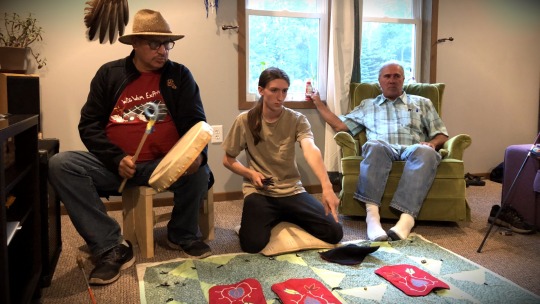
Bazile Panek (center) with David Sam of the Mille Lacs reservation (left), and Marvin Defoe from the Red Cliff Reservation (right) play Moccasin Games.
MARQUETTE, Mich. -- Bazile Panek has been playing Moccasin Games for nearly a decade. Panek, a member of the Red Cliff Band of Lake Superior Chippewa Indians, is now using his experience to educate others during an afternoon of cultural immersion and instruction at Northern Michigan University.
"I learned to play moccasin game when I was 10 years old," said Bazile Panek, a sophomore NAS major. "My dad was the one who taught me. I have a vivid memory of him coming home from work one evening, and deciding to teach my sister and I how to play this game. Ever since then, I've been participating in tournaments, weekly game sessions, and sometimes instructing others how to play this game."
Center for Native American Studies (CNAS) and NMU Native American Student Association (NASA) will host the 2019 NMU Moccasin Games on Sept. 26. This year NASA and CNAS will feature Panek and his two guests, Damon and Sophia Panek, who will present Moccasin and Dish Games respectively.
Panek’s father, Damon Gizhiibide Aanakwad Panek of the White Earth Band of Ojibwe, and sister, Sophia Panek of Red Cliff, will join Bazile from Wisconsin to further educate students, faculty and the community on traditional ways and different Moccasin Game variations.
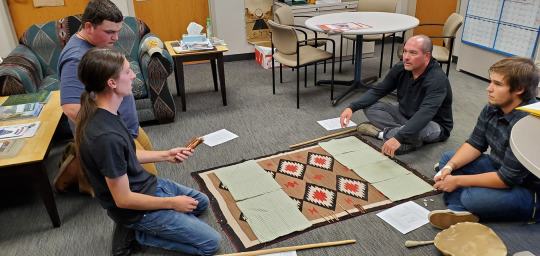
^Panek practices Moccasin Games with Dr. Martin Reinhardt, Grant Latham and Anthony Cergnul of the Native American Student Association (NASA).
On Thursday Sept. 26 at the Whitman Hall Commons on the campus of NMU from 3 p.m. - 6 p.m. a casual educational introduction to culture through competition and entertainment will be facilitated by the Paneks. NMU students, faculty, guests and the public are welcome to learn and play traditional games of the Anishinaabe people of the Great Lakes.
"Through this game, I've been able to connect to many different elders," said Panek. "Playing with elders in different communities has been very beneficial to my knowledge of the game and how it's played, as they have an immense amount of knowledge about the game, and they're really good at it."
Moccasin Games were played in area for entertainment, healing, resolving disputes, and in trade.
"Traditionally, as I've heard from my elders, this game was played by men," explained Panek. "This created an accepting space for men to interact and create a positive relationship with each other. This also created the environment for young boys to connect with older men and in turn, learn what it means to be an American Indian man. These young boys learned to be attentive, delicate, conscious, how to laugh, how to heal, and many more life lessons."
Sophia Panek will present Dish Game to further diversify the traditional games.
Panek adds students, faculty, and community members should come prepared to have a great time and learn a lot. Join the CNAS & NASA community for a fun, interactive celebration in traditional and contemporary Indigenous culture with music and drumming.
This event is free, brought to you by CNAS in collaboration with NMU's Native American Student Association. For more information call (906) 227-1397 or stay with CNAS's Facebook page and Tumblr for an upcoming blog and more information.
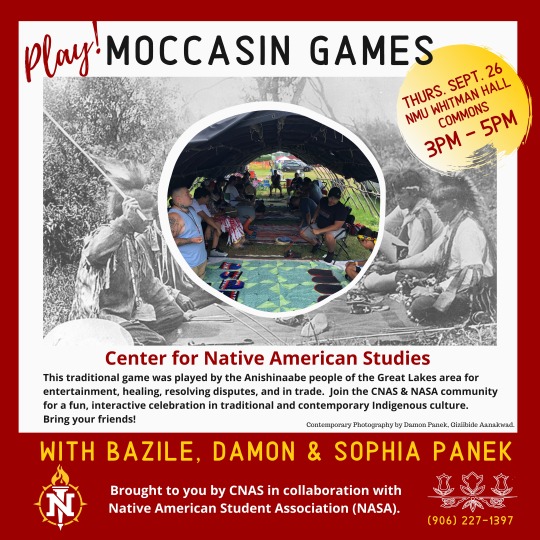
[Contemporary Photography by Damon Panek, Giziibide Aanakwad. Used with permission.]
0 notes
Text
CNAS faculty coordinating Two Spirit Talking Circle in GB
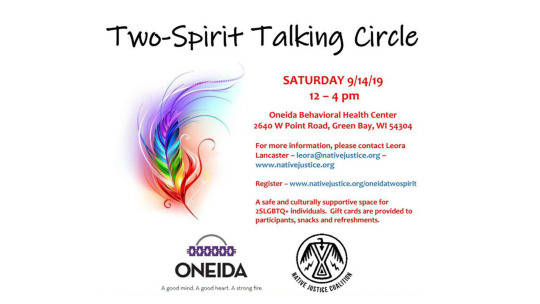
GREEN BAY, Wisc. -- The Morning Thunder Drum -- made up of Center for Native American (CNAS) faculty and NMU’s Native American Student Association (NASA) will be participating this weekend at Pride Fest in Marquette. Another unaffiliated important event in Green Bay is coordinated by CNAS faculty, Leora Lancaster.
Native Justice Coalition is inviting Indigenous community members to share their Two-Spirit stories. Participants will speak about their experiences in a safe and supportive space.
The Two Spirit Talking Circle will take place Saturday 9/14/19 at the Oneida Behavior Health Center, in Green Bay, WI, from 12:00-4:00 pm.
Registration is now closed. nativejustice.org/oneidatwospirit.
For more information, please contact the Native Justic Coalition’s Two-Spirit Project Coordinator, Leora Lancaster at [email protected] - www.nativejustice.org.
0 notes
Link
In a recent episode of Anishinaabe Radio News, April Lindala discusses Native filmmaker Jeff Barnaby bringing zombies to a First Nations reserve.
Barnaby’s inspiration for film making was born out of his childhood experience. His film is a zombie thriller that offers critical critique on colonial systems used to determine indigenous status.
“My films are Trojan horses for ideas that non-Natives wouldn’t normally engage in," said Barnaby in an interview with the nowtoronto.com. "Nobody wants to read about residential schools, but dress it up as something else and it’s 100% more palatable.”
Listen to our episode at tiny.cc/BloodQuantumARN.
0 notes
Text
Q&A with CNAS faculty highlights multicultural and LGBTQIA+/Two Spirit resources on campus
youtube
What Makes A Wild Cat - with Shirley Brozzo
MARQUETTE, Mich -- Shirley Brozzo, Associate Director of the NMU Multicultural Education and Resource Center (MERC) and Contingent Professor with the Center for Native American Studies, discusses what she's most proud of from her work at Northern, something she'd still like to learn, and what the MERC offers students.
NMU: Hey, Shirley, can we ask you some questions?
Shirley Brozzo: Sure, that would be great.
NMU: What's your official job title?
Shirley Brozzo: I am the Assistant Director of the Multicultural Education Resource Center here on campus, as well as a contingent professor with the Center for Native American Studies.
NMU: What does your job entail?
Shirley Brozzo: So I work with all of the diverse populations on campus including the LGBT population.
NMU: What are you most proud of from your work?
Shirley Brozzo: [I’m proud of] being one of the students involved in starting the minor Native American studies and now I teach in the program.
NMU: If you could tell our college students one thing what would it be?
Shirley Brozzo: That it does get better.
NMU: What are ways a student can get involved with the Center for Native American Studies?
Shirley Brozzo: I would say come and take one of our classes or come to one of the events that we offer.
NMU: Your favorite quote?
Shirley Brozzo: Breathe.
NMU: Something you'd still like to learn?
Shirley Brozzo: Oh, I really want to learn the Anishinaabe language.
NMU: Lunch with the historical figure, who would be?
Shirley Brozzo: That would be Rosa Parks. We share a birthday!
NMU: Your favorite spot on campus.
Shirley Brozzo: That would be the MERC office where I work! The MERC!
NMU: What does MERC stand for?
Shirley Brozzo: MERC is the Multicultural Education and Resource Center here on campus.
NMU: What's a resource available to students you'd like to share?
Shirley Brozzo: We always have our free printing and our printing room over here. We also have free coffee and tea and we can have snacks available for you.
NMU: How can students get involved with the MERC?
Shirley Brozzo: So just walk through the door. Everyone get services.
NMU: What's one thing that makes Northern forward thinking.
Shirley Brozzo: I think that's our nest here that we have. It's a resource room. It's the only one in the U P for LGBT population. You can come in. You could take a check out a book or a movie come in and study hang out have some fun.
NMU: What inspires you?
Shirley Brozzo: I'm inspired I think by little children because they're so open and honest with everything they say.
NMU: What's one word to describe Northern students?
Shirley Brozzo: To describe northern students, I would say determined.
NMU: What do you do outside of work?
Shirley Brozzo: I love to knit and crochet and play with my grandchildren.
NMU: You're a member of the President's Committee on Gender and Sexuality. What's that mean?
Shirley Brozzo: That means we work to find equity between all of the genders and all of the sexualities here on campus. We make sure everybody's equal.
NMU: Alright, Shirely, last question. What makes a Wildcat?
Shirley Brozzo: A Wildcat is somebody who is really determined, really successful. Someone with persistence.
NMU: All right thanks, Shirley.
Shirley Brozzo: You’re welcome!
For more videos from Northern Michigan University, visit youtube.com/NorthernMichiganU.
0 notes
